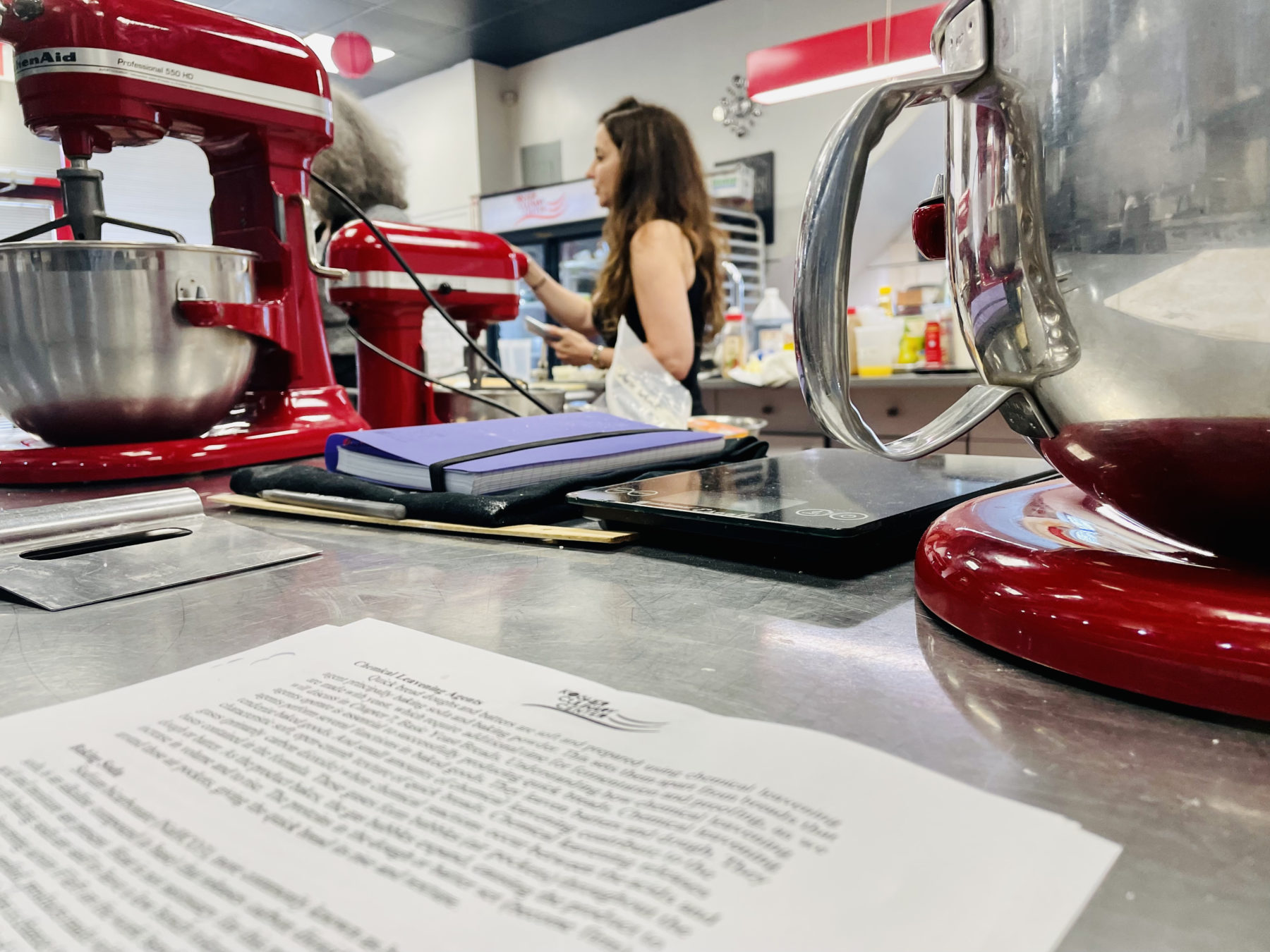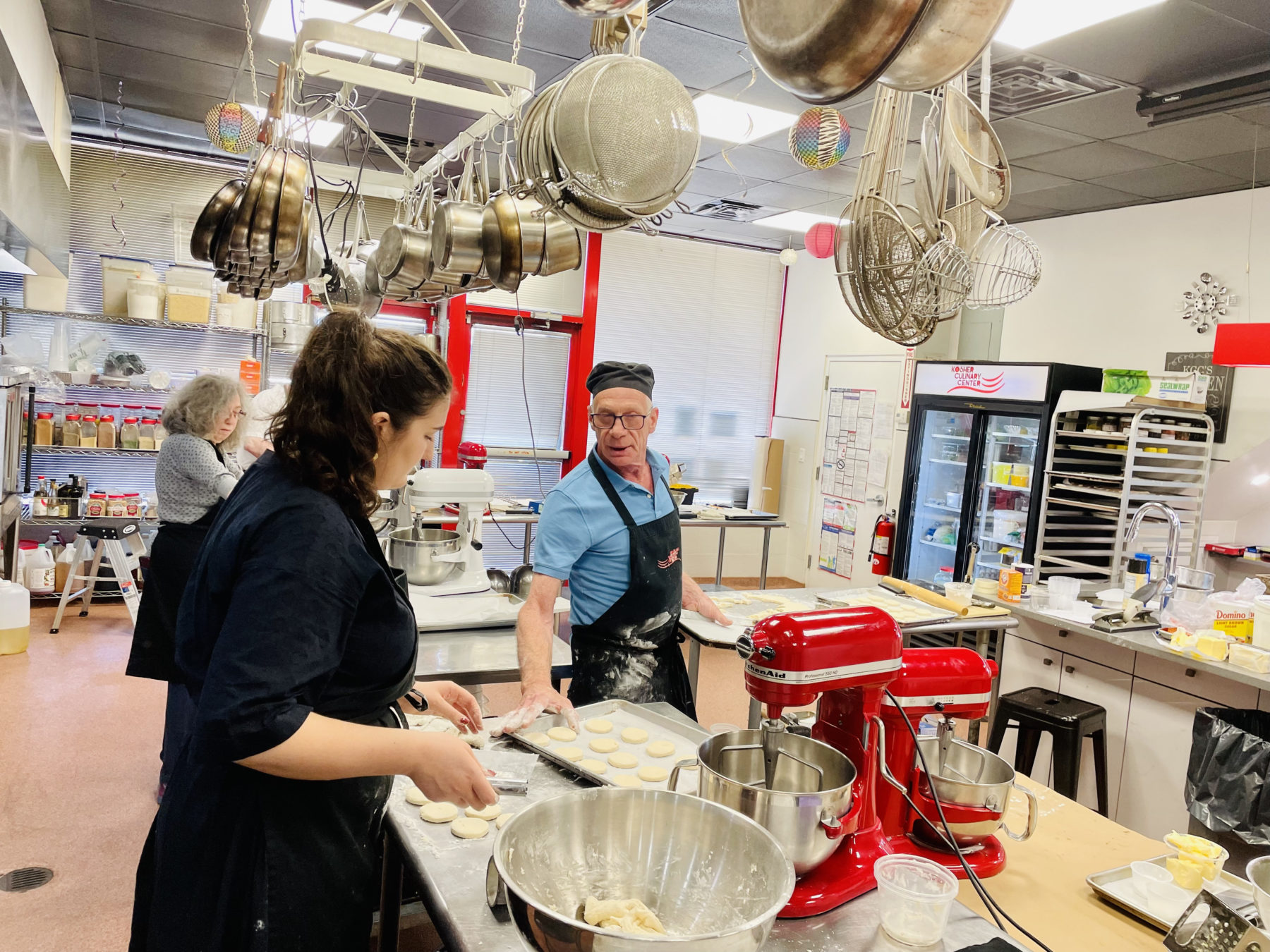Kosher cooking has a lot of rules, but that doesn’t mean that learning kosher cooking isn’t fun. During a pastry workshop at the Kosher Culinary Center in Brooklyn in July, the students — six women, one teenage boy and one man — were tasting bite-sized cocoa pear muffins that had just emerged from the oven. “These muffins are perfect for a ladies’ brunch, bridal shower or bris,” said Avram Wiseman, 64, the Center’s co-founder and chef. As the class inspected the flecks of melted chocolate and grated pears, the teenage student looked despondently at a muffin that overflowed in the baking tray. Wiseman noticed. “What do we do with our mistakes?” he asked. “We eat them!”
There’s plenty of humor at the Kosher Culinary Center, especially since it reopened to full capacity cooking classes this summer. Located in Sheepshead Bay, between Marine Park and Mill Basin, the center offers recreational cooking classes, a catering business and a professional culinary training program.
Because people experience faith at varying degrees, the center’s aim is inclusivity, and its students make up an eclectic mix of Orthodox, Conservative and Reconstructionist Jews. “We cater to everyone regardless of how religious they are,” said the center’s director and co-founder, Perline Dayan, 53. “One does not need to have knowledge of kashrut laws prior to starting our program.”
This attempt to create common ground, through food, among segments of the Jewish population that may otherwise be isolated from each other has made the center a place for members of the Jewish Brooklyn community to connect or reconnect. Recreational and professional classes are open to men and women, ages 16 and older. And things are getting busy again now that in-person gatherings are less restricted than they were last summer. “Once people got vaccinated, our class size shot up,” said Dayan.

The increased number of students has inspired the school to apply for full accreditation, which would grant it an added degree of recognition as an educational institution. It’s currently the only trade school licensed by the state of New York to teach the skills needed to work in the kosher food industry.
In addition to its classes, the center’s also seen an increase of customers who book the venue for social events. People come for Jewish Singles Night or Culinary Date Night. “The date nights always fill up fast,” said Dayan. “A few couples meet for the first time and make a signature cocktail, kalamata olive focaccia and the chef’s choice of hors d’oeuvres.” The center has also resumed catering for large party events up to 50 people, a significant increase from the 10-person average last summer.
The center certainly has the look of a place where serious cooking happens. In the airy, industrial-sized teaching kitchen are red cupboards filled with baking tools, large pieces of cookware hang from a pot rack that wraps around the ceiling and students wearing black aprons work at long silver tables. A Star of David and printouts of Hebrew prayers are taped to the entryway wall. Opposite the sink, a framed plaque displays the kosher certification signed by two rabbis from the Northern American Kosher Supervision. If it weren’t for these hints of Judaism, the Kosher Culinary Center — which founders say is the only school outside of Israel to offer professional training in the kosher culinary arts — looks just like any professional cooking school.
Wiseman’s classes are the most popular, said Dayan. “Students love him,” she said. It is easy to see why: his sense of humor and playfulness in the kitchen allows him to quote apt lessons from the Torah as he’s teaching. In a class on “quick dry breads,” Wiseman asked, “What is the origin of unleavened bread?” And when students answered “Passover,” he explained further. “When Pharoah agreed to let the Israelites go, they hurried out of Egypt. They were in such a hurry they could not let their bread rise all the way so they took it with them just as it was starting to rise. So, there you go — quick bread.”
Wiseman teaches classes in both the professional and recreational tracks. Recreational classes are shorter and focus on one theme, like breads, desserts or meats. Professional classes are much more intensive. They include 216 hours (or 54 days) of hands-on training in technical professional skills and techniques. Courses last 11-16 weeks, and participants must enter with a high school diploma or equivalent degree to obtain a certificate from the culinary program. Students are drilled on how to cook safely and skillfully in a kosher environment, and the course’s difficulty escalates from knife skills to breads, starches, stocks, fish and meat.
The school also provides counseling, networking opportunities and interview preps to help students make the transition into a full-time culinary job. Come the end of the term, students in the professional classes must take a final exam to test their knowledge of kosher rules.
Before co-founding the center with Dayan in 2015, Wiseman had been teaching for several years, most recently at the Center for Kosher Culinary Arts in Brooklyn, which closed in November 2015. He had also worked in a variety of settings, including the United Nations, where he was the executive sous chef. In that role, he said, “I cooked for several presidents: Jimmy Carter, Gerald Ford and Richard Nixon. Each one had their quirky favorites.” He also cooked there for Billy Joel and Bruce Springsteen.
Though he keeps kosher, Wiseman’s years in the culinary industry were spent cooking in non-kosher kitchens at a large, restaurant scale. His vast career network allows him to connect students with colleagues in the industry. “I’m doing this so people can gain a parnassah [the tools to make a decent living],” Wiseman said. It’s a way of passing on the trade through generations.

Dayan met Wiseman when she took a class of his in 2013 at the Center for Kosher Culinary Arts. “It opened up a whole new world. I had never tasted a beet before,” she said. Dayan, like many of Wiseman’s students, is a career switcher. After years working in the trading firm Ladenburg Thalmann and Co., she wanted a change.When the Center for Kosher Culinary Arts was forced to close because it was operating without a license, Wiseman and Dayan decided to form a partnership. “I come from accounting and he’s a professional chef,” she said. “We decided to start our own school.”
Their vision was to create a modern twist on kosher cooking. “We do traditional Jewish foods, but we do them with style,” said Wiseman. “It’s not your mother’s potato latkes. We make it gourmet.” To stay relevant, they also teach a range of global cuisines including French, Italian, Vietnamese and Greek. Recently, at the request of one student, Sephardic dishes were added such as cassola (sweet cheese pancakes), buñuelos (puffed fritters with an orange glaze), keftes de espinaka (spinach patties), and keftes de prasa (leek patties).
For Dayan, an observant Jew, the kosher component was critical to the partnership. “If it wasn’t going to be a kosher school then I wouldn’t be here,” she said. To be fully compliant as “kashrut” (kosher), the kitchen must be supervised by a rabbi, and a certified “mashgiach” (the kitchen supervisor), must always be present. The kashrut rules are strict and unyielding: no meat can coexist with dairy in the kitchen and even meat and dairy utensils must be separated. Recently, a younger student entered class with a Dunkin’ Donuts coffee and, when asked whether it contained milk, was directed to go outside and immediately throw it away. It is common practice to toss out or “tear” food that is out of order. (The Yiddish word “treif” derives from the Hebrew word for torn).
Across the spectrum of Judaism, the level of piety in the kitchen may vary. A nostalgic relationship to Jewish cuisine is sometimes described derisively as “Kitchen Judaism,” referring to Jews for whom religion revolves mainly around food. At the center, the connection between faith and food is clearer. “There’s more to Judaism than just being Jewish and cooking at the same time,” said Dayan. “So, if we have someone who is new to Judaism, we educate them on aspects of the religion.”
But regardless of the degree of piety, once students come to the center, they are part of the “whole mishpachah” (family) as Leah Waronker, a recent high school graduate and volunteer at the center, described it. “To cook kosher is to have faith in Judaism,” she said. “There’s a real intimacy that comes from working inside this community. From the moment I first put on my apron, I was welcomed with warmth. I literally fell in love.”
Back in the kitchen classroom, the smell of baked apple and cinnamon fills the room as the students begin preparing country-style biscuits. “Gentlemen,” Wiseman said to the two males in the class, “when you’re working with the flaky dough, bring out your feminine side. Be tender.” If the dough lacks moistness, he recommended more kosher butter (a non-dairy substance akin to margarine). “We grab the block of frozen butter, and we grate it like mozzarella cheese into the bowl. Now, we add vanilla. Say it with me,” he said, waving a wooden spoon like a conductor. The class recited the words after him “van-i-ll-a, van-i-ll-a, van-i-ll-a.”
For Alla Dorch, an architect and student in the pastry class, baking kosher started as a peripheral activity and is now central to her life. “Cooking is usually something I do on the way to doing something else, you know?” she said. “I have my own design studio, so this started as something I could do with my family. But now I realize the crossover with architecture and pastry — both are very precise.” As Dorch’s interest in kosher culinary arts has grown, she is now considering starting a baking business. “It’s funny,” she said. “I used to go to synagogue to think about what comes next in my life. Now I come here.”
About the author(s)
Lily Lopate is pursuing a master’s degree at Columbia Journalism School. A native New Yorker, she received a bachelor’s degree in English and Philosophy from Bryn Mawr College and also studied at St. Andrews University in Scotland. Prior to journalism, she worked at HarperCollins Publishers and Finn Public Relations. Her work has appeared in the anthology Every Father's Daughter (McPherson & Co), People Magazine, HoneySuckle Magazine, Medium and Mr. Beller's Neighborhood. She’s most interested in cultural hubs and the characters inside them, and you can find her covering arts, culture, food, metro, business and community issues.
Connect with Lily Lopate via Twitter: @Lily Lopate or lel2165@columbia.edu



